情态动词与虚拟语气
中的情态动词和虚拟语气有哪些
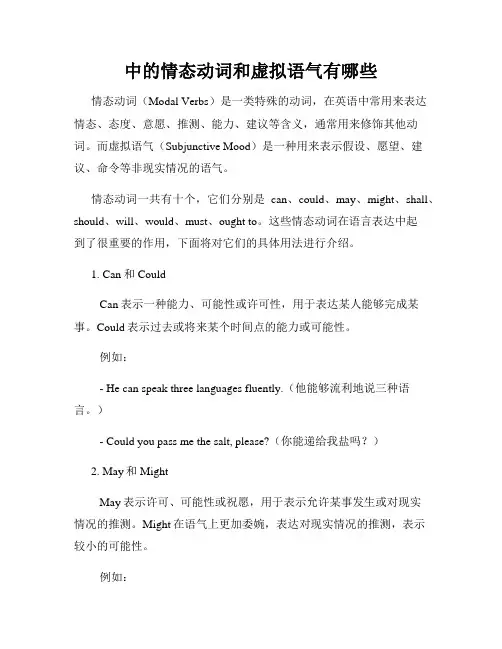
中的情态动词和虚拟语气有哪些情态动词(Modal Verbs)是一类特殊的动词,在英语中常用来表达情态、态度、意愿、推测、能力、建议等含义,通常用来修饰其他动词。
而虚拟语气(Subjunctive Mood)是一种用来表示假设、愿望、建议、命令等非现实情况的语气。
情态动词一共有十个,它们分别是can、could、may、might、shall、should、will、would、must、ought to。
这些情态动词在语言表达中起到了很重要的作用,下面将对它们的具体用法进行介绍。
1. Can和CouldCan表示一种能力、可能性或许可性,用于表达某人能够完成某事。
Could表示过去或将来某个时间点的能力或可能性。
例如:- He can speak three languages fluently.(他能够流利地说三种语言。
)- Could you pass me the salt, please?(你能递给我盐吗?)2. May和MightMay表示许可、可能性或祝愿,用于表示允许某事发生或对现实情况的推测。
Might在语气上更加委婉,表达对现实情况的推测,表示较小的可能性。
例如:- May I borrow your pen?(我可以借用一下你的笔吗?)- I may/might go to the party tonight.(我可能今晚去参加派对。
)3. Shall和ShouldShall用于征询意见或提供建议,主要用于第一人称以及第三人称的单数和复数。
Should表示某事做起来更好,用于提出建议、义务或期望。
例如:- Shall we go out for dinner tonight?(我们今晚出去吃饭吧?)- You should take a break and relax.(你应该休息一下,放松一下。
)4. Will和WouldWill表示意愿、决心或预测,表示对未来的确定或实际情况。
虚拟语气与情态动词的区别及用法解析
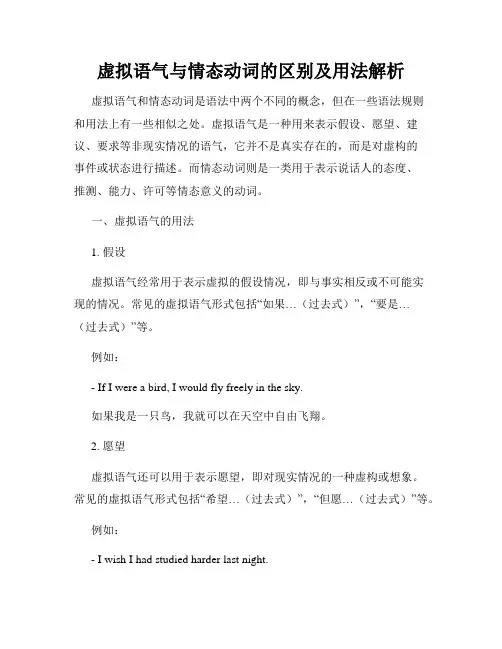
虚拟语气与情态动词的区别及用法解析虚拟语气和情态动词是语法中两个不同的概念,但在一些语法规则和用法上有一些相似之处。
虚拟语气是一种用来表示假设、愿望、建议、要求等非现实情况的语气,它并不是真实存在的,而是对虚构的事件或状态进行描述。
而情态动词则是一类用于表示说话人的态度、推测、能力、许可等情态意义的动词。
一、虚拟语气的用法1. 假设虚拟语气经常用于表示虚拟的假设情况,即与事实相反或不可能实现的情况。
常见的虚拟语气形式包括“如果…(过去式)”,“要是…(过去式)”等。
例如:- If I were a bird, I would fly freely in the sky.如果我是一只鸟,我就可以在天空中自由飞翔。
2. 愿望虚拟语气还可以用于表示愿望,即对现实情况的一种虚构或想象。
常见的虚拟语气形式包括“希望…(过去式)”,“但愿…(过去式)”等。
例如:- I wish I had studied harder last night.我希望昨晚学习更努力一些。
3. 建议、要求虚拟语气还可以用于表示建议、要求等情况。
常见的虚拟语气形式包括“(要求、建议)+过去式”。
例如:- The doctor suggested that I take some rest.医生建议我休息一下。
二、情态动词的用法1. 表示能力、推测情态动词可以用来表示说话人的能力或对某种情况的判断。
常见的情态动词有can、could、may、might等。
例如:- She can swim very well.她游泳技术非常好。
2. 表示许可、允许情态动词还可以表示许可或允许的意思。
常见的情态动词有can、may等。
例如:- Can I borrow your pen?我能借用你的笔吗?3. 表示义务、应该情态动词也可以表示说话人对某种行为或义务的责任或要求。
常见的情态动词有should、ought to等。
例如:- You should apologize to him for your mistake.你应该为你的错误向他道歉。
情态动词与虚拟语气(详解版)(新版)
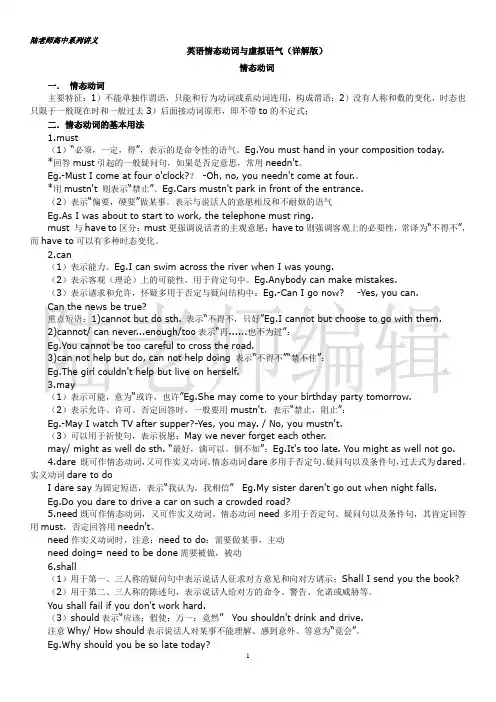
英语情态动词与虚拟语气(详解版)情态动词一.情态动词主要特征:1)不能单独作谓语,只能和行为动词或系动词连用,构成谓语;2)没有人称和数的变化,时态也只限于一般现在时和一般过去3)后面接动词原形,即不带to的不定式;二.情态动词的基本用法1.must(1)“必须,一定,得”,表示的是命令性的语气。
Eg.You must hand in your composition today.*回答must引起的一般疑问句,如果是否定意思,常用needn't。
Eg.-Must I come at four o'clock??-Oh, no, you needn't come at four.。
*用mustn't 则表示“禁止”。
Eg.Cars mustn't park in front of the entrance.(2)表示“偏要,硬要”做某事。
表示与说话人的意愿相反和不耐烦的语气Eg.As I was about to start to work, the telephone must ring.must 与have to区分:must更强调说话者的主观意愿;have to则强调客观上的必要性,常译为“不得不”,而have to可以有多种时态变化。
2.can(1)表示能力。
Eg.I can swim across the river when I was young.(2)表示客观(理论)上的可能性,用于肯定句中。
Eg.Anybody can make mistakes.(3)表示请求和允许,怀疑多用于否定与疑问结构中:Eg.-Can I go now? -Yes, you can.Can the news be true?重点短语:1)cannot but do sth. 表示“不得不,只好”Eg.I cannot but choose to go with them.2)cannot/ can never...enough/too表示“再......也不为过”:Eg.You cannot be too careful to cross the road.3)can not help but do, can not help doing 表示“不得不”“禁不住”:Eg.The girl couldn't help but live on herself.3.may(1)表示可能,意为“或许,也许”Eg.She may come to your birthday party tomorrow.(2)表示允许、许可。
情态动词与虚拟语气

[解析] D 考查虚拟语气。根据主句中的wouldn't可判 断是虚拟语气。if引导的条件状语从句对将来进行虚 拟,从句用were to do或should do或过去式。所以选D。
返回目录
专题8
返回目录
专题8
正反解读情态动词和虚拟语气
• • • •
正 面 解 读
规则2:must表示有把握的推测,意为“一定,肯定”, 用于肯定句中。如: You must be hungry after the long walk. Home cooking must be more delicious. 规则3:have to表示“必须,不得不”,着重强调客观 需 要,能用于更多时态(过去式和将来式)。如: The students today will have to know how to use computers. As he had broken his leg, he had to lie in bed.
正 面 解 读
4.will,would的用法 规则1:用于各种人称,表示意志或决心。will指现在, would则指过去。如: I will do my best to help you. They said that they would help us. 规则2:用于第二人称的疑问句中表示有礼貌的询问和 请求,would 比 will更委婉。如: Would you teach us how to drive a car? Will you please give him a message when you see him?
返回目录
情态动词和虚拟语气
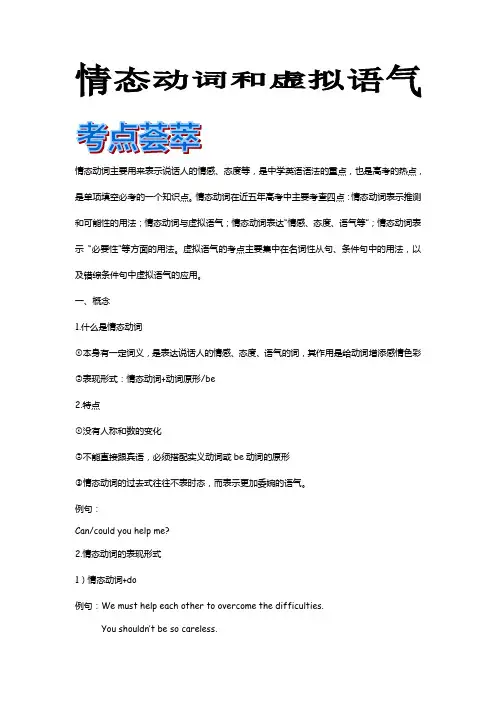
情态动词主要用来表示说话人的情感、态度等,是中学英语语法的重点,也是高考的热点,是单项填空必考的一个知识点。
情态动词在近五年高考中主要考查四点:情态动词表示推测和可能性的用法;情态动词与虚拟语气;情态动词表达“情感、态度、语气等”;情态动词表示“必要性”等方面的用法。
虚拟语气的考点主要集中在名词性从句、条件句中的用法,以及错综条件句中虚拟语气的应用。
一、概念1.什么是情态动词①本身有一定词义,是表达说话人的情感、态度、语气的词,其作用是给动词增添感情色彩②表现形式:情态动词+动词原形/be2.特点①没有人称和数的变化②不能直接跟宾语,必须搭配实义动词或be动词的原形③情态动词的过去式往往不表时态,而表示更加委婉的语气。
例句:Can/could you help me?2.情态动词的表现形式1)情态动词+do例句:We must help each other to overcome the difficulties.You shouldn’t be so careless.2)情态动词+be doing例句:She must be sleeping now.My mother may/might be cooking now3)情态动词+be done例句:Difficulties can and must be overcome.Something must be done to stop pollution.4)情态动词+have done例句:You ought to have come earlier.They might have finished the work.二、情态动词的分类1.只能作情态动词:must, can/could, may/might2.可作情态动词也可作助动词的:will/would, shall/should3.可作情态动词有可作实义动词的:need,dare4.具有情态动词特征的:ought to, have to, be able to三、分类讲解1.can /could1)表示能力:会,在表示过去的能力时用could例句:I can swim.Lucy can dance well and her mother could dance well when she was young.The cinema can seat 500 people.I could not read such an easy book when I was 7 years old.2)表允许,许可常用在口语中,此时could 不表示过去式,而表示语气上比can更客气。
语法专题7情态动词和虚拟语气
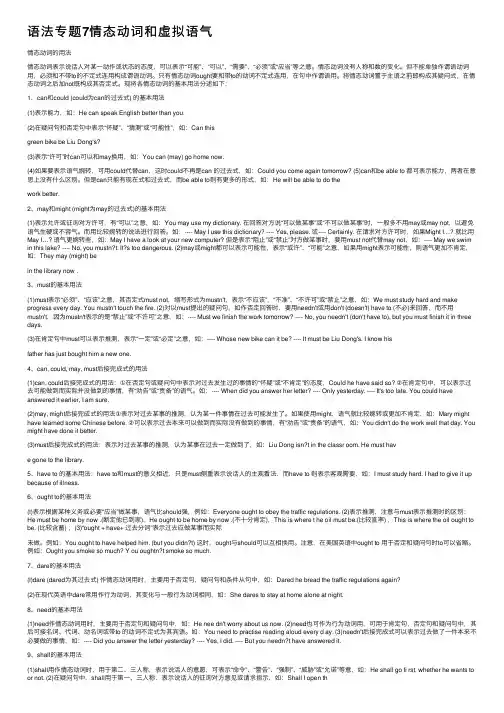
语法专题7情态动词和虚拟语⽓情态动词的⽤法情态动词表⽰说话⼈对某⼀动作或状态的态度,可以表⽰“可能”、“可以”、“需要”、“必须”或“应当”等之意。
情态动词没有⼈称和数的变化。
但不能单独作谓语动词⽤,必须和不带to的不定式连⽤构成谓语动词。
只有情态动词ought要和带to的动词不定式连⽤,在句中作谓语⽤。
将情态动词置于主语之前即构成其疑问式,在情态动词之后加not既构成其否定式。
现将各情态动词的基本⽤法分述如下:1、can和could (could为can的过去式) 的基本⽤法(1)表⽰能⼒,如:He can speak English better than you.(2)在疑问句和否定句中表⽰“怀疑”、“猜测”或“可能性”,如:Can thisgreen bike be Liu Dong's?(3)表⽰“许可”时can可以和may换⽤,如:You can (may) go home now.(4)如果要表⽰语⽓婉转,可⽤could代替can,这时could不再是can 的过去式,如:Could you come again tomorrow? (5)can和be able to 都可表⽰能⼒,两者在意思上没有什么区别。
但是can只能有现在式和过去式,⽽be able to则有更多的形式,如:He will be able to do thework better.2、may和might (might为may的过去式)的基本⽤法(1)表⽰允许或征询对⽅许可,有“可以”之意,如:You may use my dictionary. 在回答对⽅说“可以做某事”或“不可以做某事”时,⼀般多不⽤may或may not,以避免语⽓⽣硬或不容⽓。
⽽⽤⽐较婉转的说法进⾏回答。
如:---- May I use this dictionary? ---- Yes, please. 或---- Certainly. 在请求对⽅许可时,如果Might I…? 就⽐⽤May I…? 语⽓更婉转些,如:May I have a look at your new computer? 但是表⽰“阻⽌”或“禁⽌”对⽅做某事时,要⽤must not代替may not,如:---- May we swim in this lake? ---- No, you mustn?t. It?s too dangerous. (2)may或might都可以表⽰可能性,表⽰“或许”、“可能”之意,如果⽤might表⽰可能性,则语⽓更加不肯定,如:They may (might) bein the library now .3、must的基本⽤法(1)must表⽰“必须”、“应该”之意,其否定式must not,缩写形式为mustn't,表⽰“不应该”,“不准”、“不许可”或“禁⽌”之意,如:We must study hard and make progress every day. You mustn't touch the fire. (2)对以must提出的疑问句,如作否定回答时,要⽤needn't或⽤don't (doesn't) have to (不必)来回答,⽽不⽤mustn't,因为mustn't表⽰的是“禁⽌”或“不许可”之意,如:---- Must we finish the work tomorrow? ---- No, you needn't (don't have to), but you must finish it in three days.(3)在肯定句中must可以表⽰推测,表⽰“⼀定”或“必定”之意,如:---- Whose new bike can it be? ---- It must be Liu Dong's. I know hisfather has just bought him a new one.4、can, could, may, must后接完成式的⽤法(1)can, could后接完成式的⽤法:①在否定句或疑问句中表⽰对过去发⽣过的事情的“怀疑”或“不肯定”的态度,Could he have said so? ②在肯定句中,可以表⽰过去可能做到⽽实际并没做到的事情,有“劝告”或“责备”的语⽓。
高中英语语法总结:情态动词和虚拟语气
高中英语语法总结:情态动词和虚拟语气考向1 情态动词一、 can, could与be able to1. 表示能力(体力、知识、技能)。
☞Can you lift this heavy box?(体力)☞Mary can speak three languages.(知识)☞Can you skate?(技能)此时可用be able to代替。
can只有一般现在时和一般过去式;而be able to则有更多的时态。
☞I’ll not be able to come this afternoon.当表示"经过努力才得以做成功某事"时应用be able to,不能用can。
如:☞He was able to go to the party yesterday evening in spite of the heavy rain.2. 表示请求和允许。
☞—Can I go now?—Yes, you can. / No, you can’t. 此时可与may互换。
在疑问句中还可用could, might代替,不是过去式,只是语气更委婉,不能用于肯定句和答语中。
☞—Could I come to see you tomorrow?—Yes, you can. (No, I’m afraid not.)3. 表示客观可能性(客观原因形成的能力)。
☞They’ve changed the timetable, so we can go by bus instead. This hall can hold 500 people at least.4. 表示推测(惊讶、怀疑、不相信的态度),用于疑问句、否定句和感叹句中。
☞Can this be true?☞This can’t be done by him. How can this be true?二、 may, might1. 表示请求和允许。
might比 may语气更委婉,而不是过去式。
原题目:虚拟语气与情态动词区别
原题目:虚拟语气与情态动词区别虚拟语气与情态动词区别虚拟语气和情态动词是中文和英文语法中常见的两个概念,它们在用法和含义上有一些区别。
下面将分别介绍虚拟语气和情态动词,并对它们的区别进行说明。
虚拟语气虚拟语气(Subjunctive Mood)是一种用来表达非现实情况的语气。
它主要用于以下几种情况:1.虚拟条件句:用于表达假设、愿望、建议等。
例如:如果我是你,我会去旅行。
(表达假设)例如:愿你健康快乐。
(表达愿望)2.虚拟假设句:用于表达假设、猜测、推测等。
例如:要是明天下雨,我们就不出去玩了。
(表达假设)例如:我希望他能来参加聚会。
(表达愿望)3.虚拟感叹句:用于表达感叹、遗憾等。
例如:唉,要是我早点知道就好了。
(表达感叹)虚拟语气在中文中的表达方式较为灵活,通常通过上下文以及词语的语气来进行判断。
情态动词情态动词(Modal Verbs)是一类用来表示说话人的态度、能力、推测等的动词。
它们通常没有人称和数的变化,且后面一般接不定式。
常见的情态动词包括:可以、能够、会、必须、应该、愿意等。
情态动词在句子中具有以下几个特点:1.可以用来表达能力、权利、许可等。
例如:我可以帮你做作业。
(表达能力)例如:你可以去看电影。
(表达许可)2.可以用来表达推测、可能性等。
例如:他可能会来参加晚会。
(表达可能性)例如:明天可能会下雨。
(表达推测)3.可以用来表示意愿、建议等。
例如:你应该多锻炼身体。
(表达建议)例如:我愿意帮助你。
(表达意愿)情态动词在英文中有一定的变化规律,例如在一般现在时中,第三人称单数要加“s”。
区别虚拟语气和情态动词的区别主要体现在以下几个方面:1.虚拟语气用于表达非现实情况,而情态动词则用于表达说话人的态度、能力、推测等。
2.虚拟语气的用法较为固定,而情态动词的用法较为灵活。
3.虚拟语气在中文中的表达方式通常通过上下文以及词语的语气来判断,而情态动词则具有一定的变化规律。
在具体的语言表达中,我们需要根据上下文和语境来判断应该使用虚拟语气还是情态动词,以确保符合语法和意义的要求。
语法篇专题情态动词和虚拟语气
用法
例句
can和could
表示能力
He can speak English better than you.
表示请求 或允诺?
You can have the book when I have finished it. Could you come again tomorrow?
表示客观可能性
should have done
过去本来应该……,而实际上没有……
The plant is dead. Maybe I should have given it more water.
ought to have done
过去本该……,而未……
You ought to have given him more help.
专题八 情态动词和虚拟语气
情态动词
一、情态动词 定义:情态动词是一种本身具有一定词义,但要与动词原形及其被动语态一起使用的词。它给谓语动词增添情态色彩,表示说话人对有关行为或事物的态度和看法,认为其可能、应该或必要等。 二、情态动词的特点 情态动词无人称和数的变化, 情态动词后面跟的动词需用原形,否定式构成是在情态动词后面加“not”。 个别情态动词有现在式和过去式两种形式, 过去式用来表达更加客气, 委婉的语气, 时态性不强, 可用于过去,现在或将来。情态动词属于非及物动词,故没有被动语态。
三、情态动词的语法特征 (1) 情态动词不能表示正在发生或已经发生的事情,只表示期待或估计某事的发生。 (2) 情态动词除ought 和have 外,后面只能接不带to 的不定式。 (3) 情态动词没有人称和数的变化,即其第三人称单数不加s。 (4) 情态动词没有非限定形式,即没有不定式,分词形式,也没有相应的动名词。 四、情态动词的基本用法
情态动词与虚拟语气
情态动词与虚拟语气【语法要点】情态动词所谓情态动词是指它含有一定的含义,可以表达某种感情和说话的语气,但是它不可以单独使用作谓语动词。
学习情态动词主要学习英语国家的语言习惯和表达法,特别是在口语中不要过分追求原理,更不要不根据说话场合而进行推理,编造出一些语法结构正确的中文式英语。
一、情态动词的类型1.只作情态动词的有:must、can、could、may、might、ought to2.既可作情态动词又可作实义动词的有:need、dare3.既可作情态动词又可作助动词的有:shall、should、will、would二、情态动词的特征>1.表示说话人的情感态度,不能单独作谓语,与行为动词或连系动词一起作谓语。
2.情态动词没有人称和数的变化,后接动词原形。
3.具有助动词的特征:可用来构成否定句、疑问句或简短答语。
三、情态动词的用法1.表示能力(1)表示现在的能力,用can或be able to。
表示一般的能力时多用can,表示“经过努力成功的做成某事”用be able to。
(2)表示过去的能力,用could或was/were be able to。
区别同上。
(3)表示将来的能力,用will be able to。
2.表示推测、可能性(1)can用在肯定句中表示客观的可能性,而不表示具体事情实际发生的可能性。
—例如:Accidents can happy on such rainy days.(2)表示具体事情实际发生的可能性的情态动词,其表示可能性的层次如下表:注意→(1)may,must常用于肯定句,一般不用于否定句和疑问句。
(2)can常用于否定句,疑问句和感叹句中,表示疑惑、惊讶或不相信等意思。
could既可用于肯定句,又可用于否定句、疑问句中。
(3)would、could、should、might并不一定与过去时间有关,而是表示可能性弱于其相对应的现在时形式。
3.表示请求、允许、允诺(1)当你(们)代表你(你们)自己(I、we)或第三者(he、she、they)向对方(you)即决策者请示或提出建议时,使用:①shall/may/might/can/could I/We…②Shall he(she/they)…#③Would/Will/Could/Can you…could、might、would并不表示过去时间,而表示更委婉的语气。
- 1、下载文档前请自行甄别文档内容的完整性,平台不提供额外的编辑、内容补充、找答案等附加服务。
- 2、"仅部分预览"的文档,不可在线预览部分如存在完整性等问题,可反馈申请退款(可完整预览的文档不适用该条件!)。
- 3、如文档侵犯您的权益,请联系客服反馈,我们会尽快为您处理(人工客服工作时间:9:00-18:30)。
一.情态动词1.---Could I borrow your dictionary?----Yes,of course you_____.A.mightB. willC. canD. should2.---Shall we go skating or stay at home?----Which _____do yourself?A.do you ratherB.would you ratherC.will you ratherD.should you rather3.It’s nearly seven o’clock.Jack ___be here at any moment.A. must B need C should D can4.A computer __think for itself ,it must be told what to do.A. can’t B couldn’t C may not D might5. Johnny,you ___play with the knife.You ___hurt yourself.A.won’t ;can’tB. mustn’t; mayC. shouldn’t; mustD. can’t; shouldn’t6.—Shall I tell John about it?-----No,you _____.I’ve told him already.A. needn’tB.wouldn’tC. mustn’tD. shouldn’t7.---Don’t forget to come to my birthday party tomorrow.----______.A.I don’tB.I won’tC.I can’tD.I haven’t8.He ____you more help,even though he was busy.A.might have givenB.might giveC.may have givenD.may give9.----There were already five people in the car but they managed to take me as well. ---It ___a comfortbable journey.A.can’t beB.shouldn’t beC.mustn’t have beenD.couldn’t have been10.I told Sally how to get there ,but perhaps I ___for her.A.had to write it outB.must to have written it outC.should have written it outD.ought to write it out11.---When can I come for photos?I need them tomorrow afternoon.---They ___be ready by 12:00.A.canB. should C might D need12.---I stayed at a hotel while in New York.----Oh,did you?You ____with Barbara.A.could have stayedB.could stayC.would stayD.must have stayed13.-----Alice, you feed the bird today.____?-----But I fed it yesterday.A.do youB.will youC.didn’t youD.don’t you14.The fire spread through the hotel very quickly but everyone ____get out.A.had toB.wouldC.was able toD.could15.---Will you stay for lunch?----Sorry,___.My brother is coming to see me.A.I mustn’tB.I can’tC.I needn’tD.I won’t16.-Are you coming to Jeff’s party?---I’m not sure.I ____go to the concert instead.A.muchB.wouldC.shouldD.might17.I was really anxious about you .You ____home without a word.A.mustn’t leaveB.shouldn’t have leftC.couldn’t have leftD.needn’t leave二.虚拟语气18.—We could have walked to the station,it was so near.---Yes .A taxi ___at all necessary.A.wasn’tB.hadn’t beenC.wouldn’t beD.won’t be19.I didn’t see your sister at the meeting .If she __,she would have met brother.A.has comeB.did comeeD.had come20.—If he _____,he ___that food.-----Luckily he was sent to the hospital immediately.A.was warned;would not takeB.had been warned;would not have takenC.had be warned;had not takenD.would have been warned;had not taken21.When a pencil is partly in a glass of water,it looks as if it____.A.breaksB.has brokenC.were brokenD.had been broken22.If it _____for the snow,we ___the mountain yesterday.A.were not;could have climbedB.were not ;could climbC.had not been;could have climbedD.had not been ;could climb23.Without eletricity,human life ___quite difficult today.A.isB.will beC.would have beenD.would be24.I didn’t see your sister at the meeting.If she ___,she would have met my brother.A.has comeB.did comeeD.had come【习题精选】1.---Did you finish your homework ?--No. We ____it ,but we spent too much time watching TV.A.could have finishedB.must have finishedC.can’t have finishedD.shouldn’t have finished2.---You must phone us when you get there.----Yes,I____.A.mustB.have toC.willD.should3.Peter _____come to our party tonight ,but he isn’t sure yet.A.mustB.mayC.canD.will4.I wish I ______what was going to happen.A.knowB.knewC.have knownD.will know5.---Could I borrow your bike?---Yes,of course you ___.A.mightB.shouldC.canD.will6.If only he ___to buy some fruit,we would have something to eat.A. had rememberedB.rememberedC.will rememberD.remembers7.But for the rain,we ____a nice holiday.A.have hadB.will have hadC.would have hadD.had8.John,you ____play with the knife ,you __hurt yourself.A.won’t ;can’tB.mustn’t ;mayC.shoudn’t ;mustD.can’t ;shouldn’t9.It was ordered that no parking ___allowed in front of the building.A.isB.beC.wasD.would be10.She ____out alone at night.A.dare not to goB.dare not goC.doesn’t dare to goD.doesn’t dare go11.I ____up early this morning ,so I stayed in bed until 8o’clock a.m.A.needn’t have gotB.didn’t need to getC.shouldn’t have gotD.can’t have got12.Mary ____my letter,otherwise she would have gone to the concert.A.has receivedB.ought to have receivedC.couldn’t have recevedD.shouldn’t have received13.---Shall I book a table for the dinner?---No,you _____;the restaurant won’t be full this evening.A.wouldn’tB.mustn’tC.couldn’tD.needn’t14.____hand in his exercise book before Monday?A.Need he toB.Does he needC.Needs he toD.Need he15.By reading quickly,I __the book before the library closed.A.could he finishingB.could have finishedC.could finishD.can finish16.---Must I get through the business in one evening?-----No,you _____.A.mustn’tB.haven’t toC.needn’t toD.don’t have to17.Close the door behind you,___?A.don’t youB.do you C .shall you D.will you.18.Let us play basketball ,___?A.will youB.don’t youC.shall weD.do you19.Let’s clean our classroom,____?A.will youB.don’t weC.shall weD.do you20.He ____his lunch now;the dining ha ll hasn’t opened yet.A.mustn’ t be havingB.shouldn’t be havingC.needn’t be havingD.can’t be having21.He ____me your secret.But he meant no harm.A.should have toldB.ought not to toldC.would not tellD.ought not to have told22.He ____come here.A.dared not toB.dare notC.does dare notD.dare not to23.----Why didn’t you buy it ?----I _____,but I didn’t have th money.A.wouldB.would haveC.had hadD. had bought24.---Would you like to go to the cinema tonight ?--I wish I ___,but I have to study for a test.A.hadB.wouldC.couldD.did25.----___it be Tom who swept the floor?---No.It ___be Mary who did it.A.Can;willB.Could ;mustC.Might ;mustD.Must;must26.When I was in difficult,he ____gladly help me.But he gives me no help at all.I wonder why.A.woulded toC.was used toD.is used to27.-----Professor Li,many students want to see you.----__they wait here or outside ?A.DoB.WillC.ShallD.Are28.----What has happened to Tom?-----I don’t know.He ___lost.A.could getB.might getC.can have gotD.may have got29.You ___have the book as soon as I finished it.A.willB.mustC.canD.shall30.Why did you throw the bottle out of the window?You ___somebody.A.might hurtB.could have hurtC.would hurtD.must have hurt31.----Is he all right now?----Yes.Who __that such a serious illness could be cured?A.had thoughtB.has thoughtC.was thinkingD.would have thought32.---Be sure to get there on time,____you?----Of couse,we_____.A.will;willB.won’t ;shallC.don’t ;doD.can ;must33.—Why do you ask me to do difficult work?---Because you ____do such a tight and nobody is fit for it.A.wouldB.can D.should D.may34.We have been away for twenty years .You __imagine how delighted we were when meeting again.A.mustB.canC.willD.might35.She ____the hospital so soon, for she has not yet recovered.A.wouldn’t have left Bshouldn’t have leftC.could have lef tD.mustn’t have left36.---I wonder if I ____smoke here?----No,you ___.Could you see the sign “NO SMOKING”there?A.can;needn’tB.shall;won’tC.must;can’tD.may;mustn’t37.---How about going at four this afternoon?---OK,that ____be a good time for me.Where shall we meet ?A.wouldB.couldC.mightD.should38.----What happened to the roses I gave you?---The roses ______well,but I didn’t water them.A.would growB.might growC.would have grownD.needn’t have grown39.The line was busy;somebody____the telephone.A.may have usedB.may be usingC.must have been usingD.must be using40.---I hear you have written a book.----Yes ,the book ____be out in a month or so.A.canB.dareC.shouldD.need41.I will try it again,though I ___fail.A.canB.shallC.mayD.will42.He pushed the door again and again,but it ____ open.A.may notB.can’tC.didn’tD.wouldn’t43.When winter comes,some birds __fly away to the south.A.willB.wouldC.canD.should44.You say you will not do it,but I say you ____do it.A.shallB.willC.wouldD.need45.-----Won’t you tell me more about your problem?---I ___talk about it any more.A.would rather not toB.wouldn’t ratherC.would rather notD.wouldn’t r ather to46.It’s necessary that you ___spoken English now and then.A. might practiseB.must practiseC.should practiseD.practised47.My suggestion is that a few more people a few more people __there to help me.A.be sentB.have sentC.sentD.should send48.It is high time that all of you ____to bed.A.goB.will goC.must goD.went49.The teacher demanded that the exam __before eleven.A.would be finishedB.must be finishedC.be finishedD.must he finishing50.I’d rather you _____at home all day today.A.stayB.stayedC.should stayD.have stayed。
